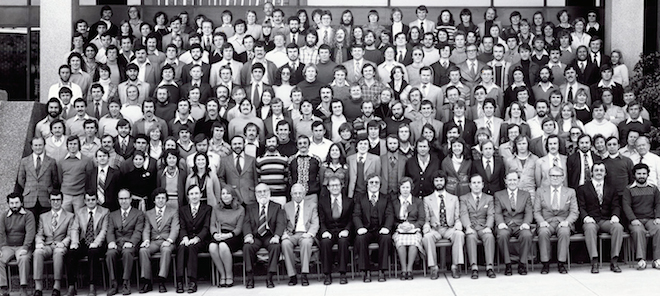Slicing-up the pie for the post-admission legal education market ... Lots of loot at stake as College of Law tries to push the NSW Law Society off a cliff ... Constitutional amendment ... Getting out from under the skirts
 The College of Law's class of 1977
The College of Law's class of 1977
IT'S dreadful to have to report an unhappy stand-off between the Law Society of NSW and its love child the College of Law.
The COL wants to break its ties with the society and has pressed for a change to its constitution so as to remove the Law Soc's power of veto over major decisions
Last month Joe Catanzariti, the chairman of the College of Law, wrote to the Law Society asking that the relationship between the two bodies be terminated.
The COL claims that the Law Society's role on its board of governors is conflicted because it also engages in continuing legal education, one of the COL's core businesses.
The Law Soc has a veto power on the board of the college, under a constitution drawn up by Mallesons in December 2010.
As founder of the college, the Law Society nominates a "preferred foundation ordinary member" to the COL's corporate entity, usually the Law Soc president - at the moment Ros Everett. The PFOM is not on the board of the college, but effectively can have the final say in most of its major decisions.
Effectively, Catanzariti and the COL were asking Everett to sack herself from any engagement with the organisation the Law Society spawned and funded with solicitors trust account money (now totalling about $30 million).
Under its constitution the College of Law cannot implement a number of decisions without the prior written consent of the PGOM, including: changing the constitution, appointing a new chair or deputy chair, entering into transactions involving capital expenditure, and establishing or joining any business primarily involved in activities in NSW similar to a core service or activity carried out by the Law Society.
Extraordinarily, the constitution of the COL provides:
"The initial board of governors on adoption of this constitution will be appointed by the founder [the Law Society]. The initial chair of the company will be Joseph John Catanzariti."
That's a nifty piece of crafting, to get yourself embedded in the seminal document as the chairman.
Catanzariti's still there, as well as being a vice-president of the Fair Work Commission.
It was suggested during discussions involving Catanzariti and College of Law managing director Neville Carter, that in deliberating on this request for constitutional change, the president of the Law Society was obliged to consider the issue exclusively in terms of what was best for the College of Law.
The society went to John Morgan at Allens for an opinion. He said that the proposed changes, sought by the COL, would delete the role of the Law Society and its representative.
"In other words the proposal [is to] sever the ties between the College of Law and the Law Society of NSW."
 Morgan: advised that the decision of the PFOM was unfettered
Morgan: advised that the decision of the PFOM was unfettered
His advice was that if the preferred foundation ordinary member had any duty at all, it would be a duty "to have regard to the interests of the Law Society of NSW in the exercise of the power which the member has".
In these circumstances, Ros Everett's discretion is "unfettered".
Law Society CEO Michael Tidball prepared a confidential memo for the Law Society Council setting out the background and the arguments for an against severing ties with the COL.
Historical background
The current constitution of the COL came into effect in 2010 following resolution of legal uncertainties over college property which was subject to educational purpose trusts. It was felt that with the college, as it then was, running as a wholly owned subsidiary of the Law Society it would eventually be liable for a big tax bill.
On November 1, 2010, following orders by the NSW Supreme Court, the college property and business were transferred from College of Law Pty Ltd to The College of Law Ltd. The company now has five operating subsidiaries providing legal training services in Victoria, Queensland, Western Australia and New Zealand.
Here's Catanzariti celebrating the 40th birthday of the COL ...
It is a national and international outfit with a $25 million, eight story, building at St Leonards in Sydney.
After taking over the Victorian CLE operations of the Leo Cussen Institute, the College of Law was paying the Law Institute of Victoria a whopping 20 percent of the gross revenue of that business.
Against
Tidball in his memo said that the 2010 constitutional alignment was "designed to give the Law Society an enduring interest in the governance of the college".
Councillors at the time of the change in the COL's governance structure felt that the Law Society had an obligation to keep the college "within the fold".
"It may be argued that the College of Law is effectively seeking to walk away from a structure which it proposed and which balanced the historic connection with the College of law.
It is difficult to discern how the current constitutional structure is restricting the College of Law's ability to play in the higher education post-admission market."
For
Tidball says the changes to the ownership structure of the COL, over the years, "has come at the cost of a high degree of harmony in relationships".
If the Law Society lost its veto power it would be able more readily to get into the "full spectrum" of post-admission educational programs.
This applied to CPD, "which is a growing revenue source for the society" - believed to currently be running at $300,000 a year.
Further new lines of business could open up if the Law Society ran a practice management course of its own, as well as entering the practical legal training market.
"It is understood that the College of Law is currently losing market share in the PLT market, and it may well be that there are potential commercial openings for the law Society of NSW in pursuing the growth of new streams of business activity. Done in a strategic way, this development could strengthen our membership retention in the years ahead."
Outcome
The Law Society council unanimously opposed the College of Law proposal, with one abstention.